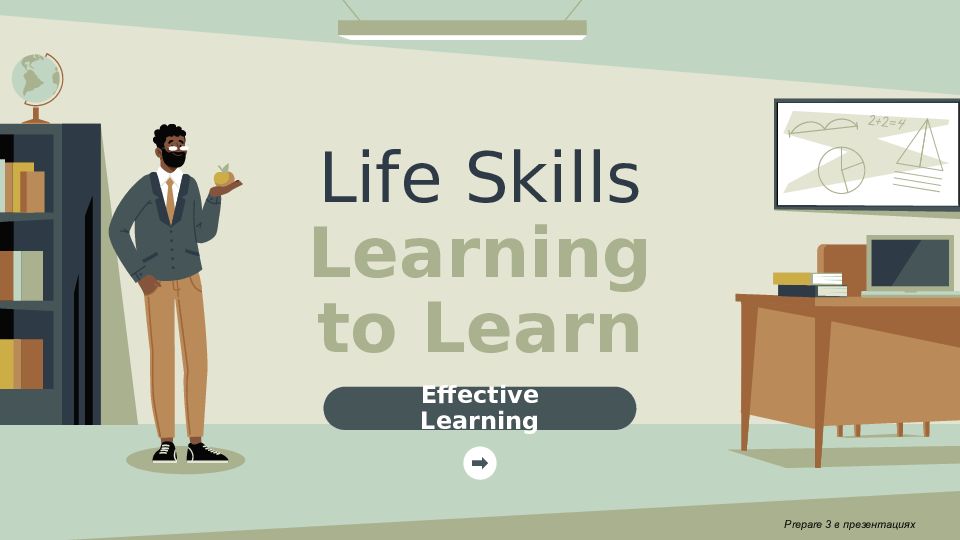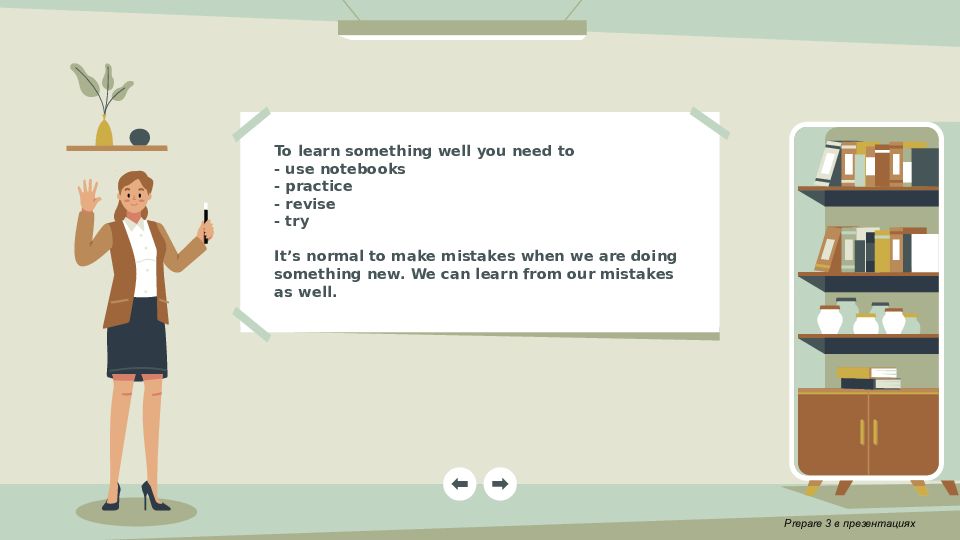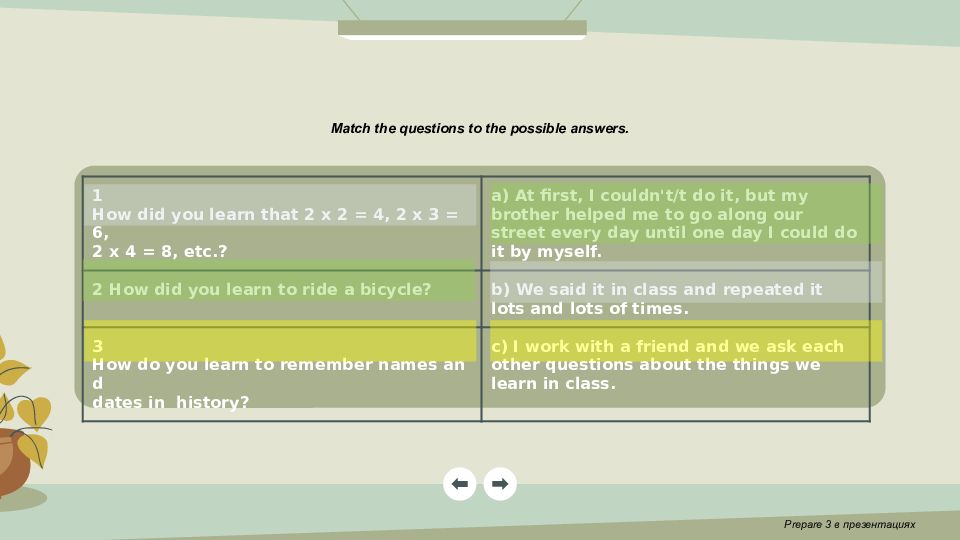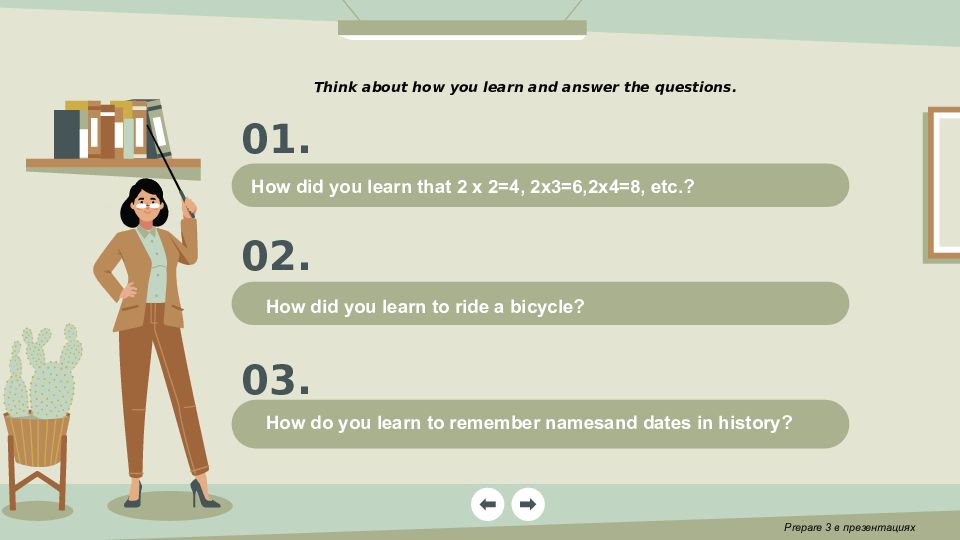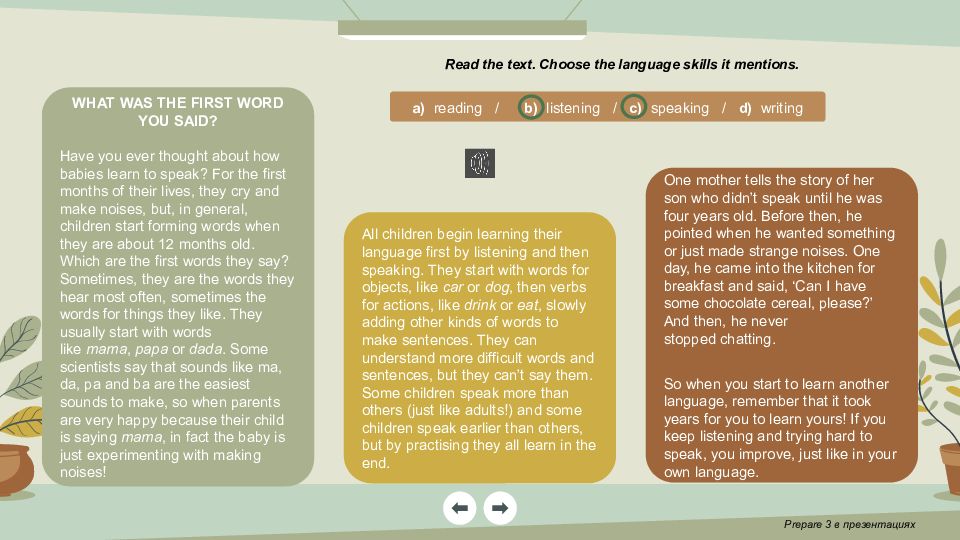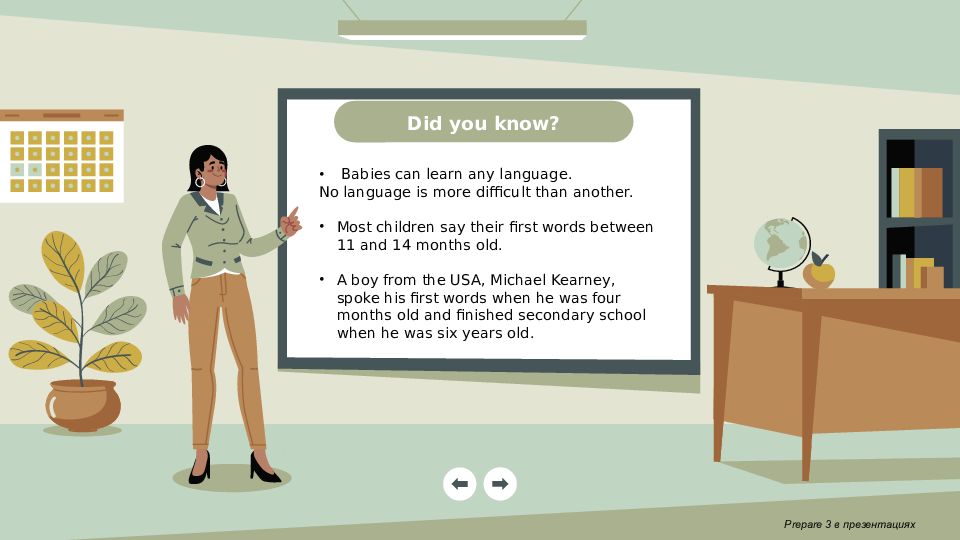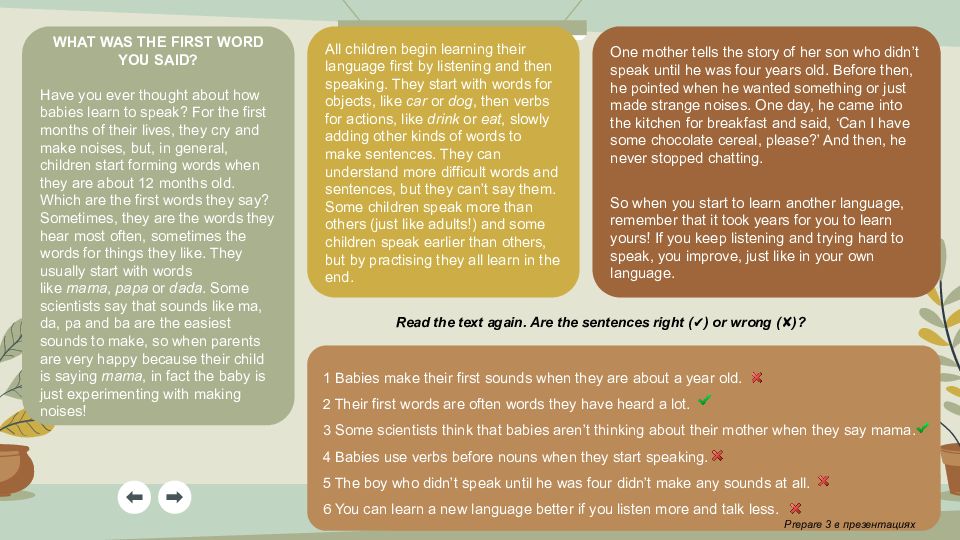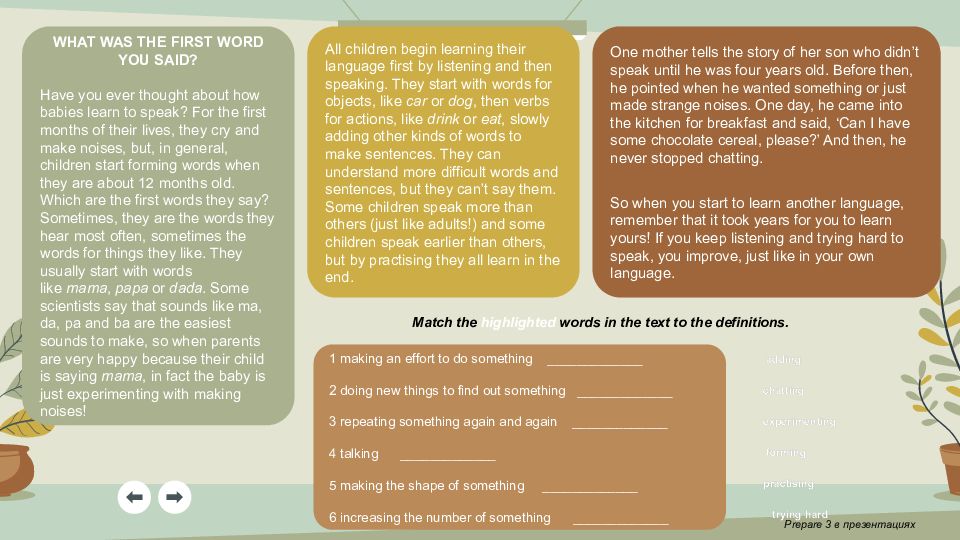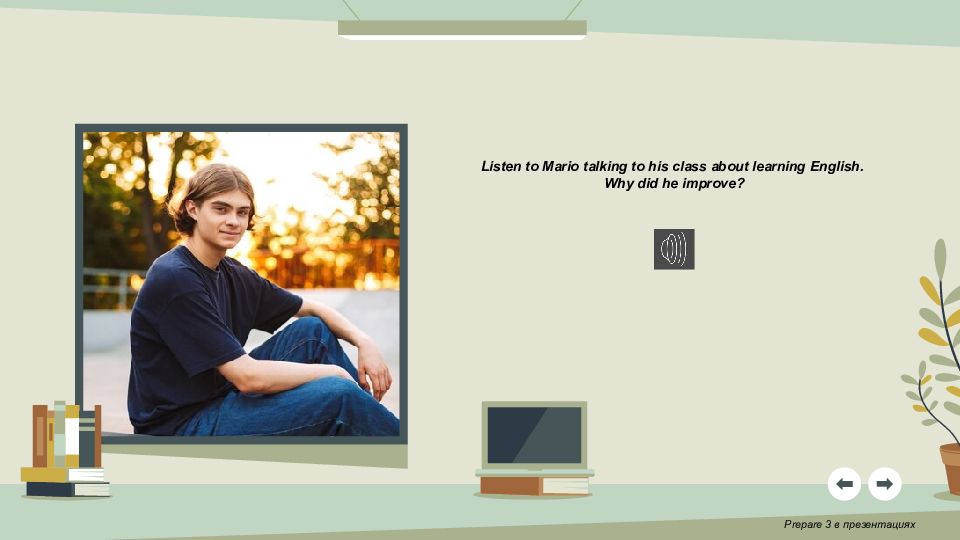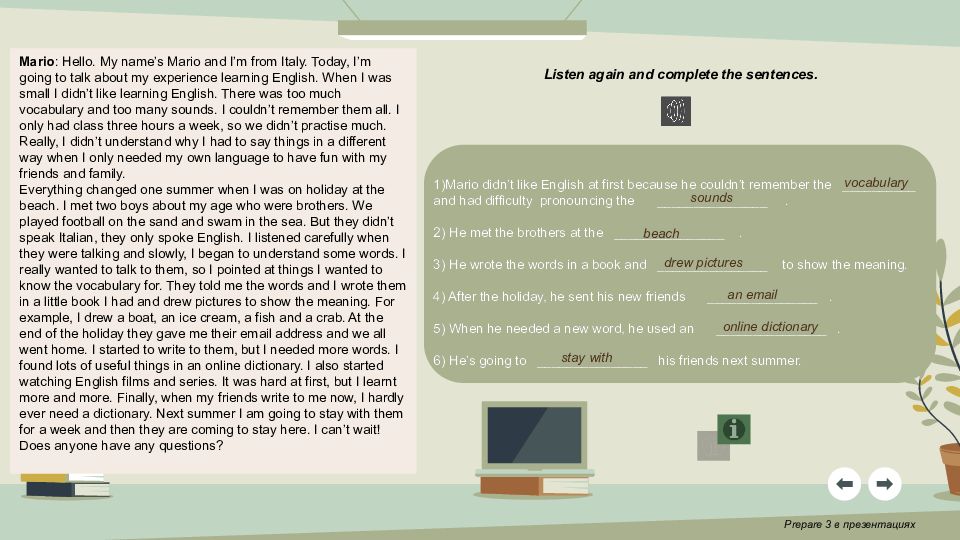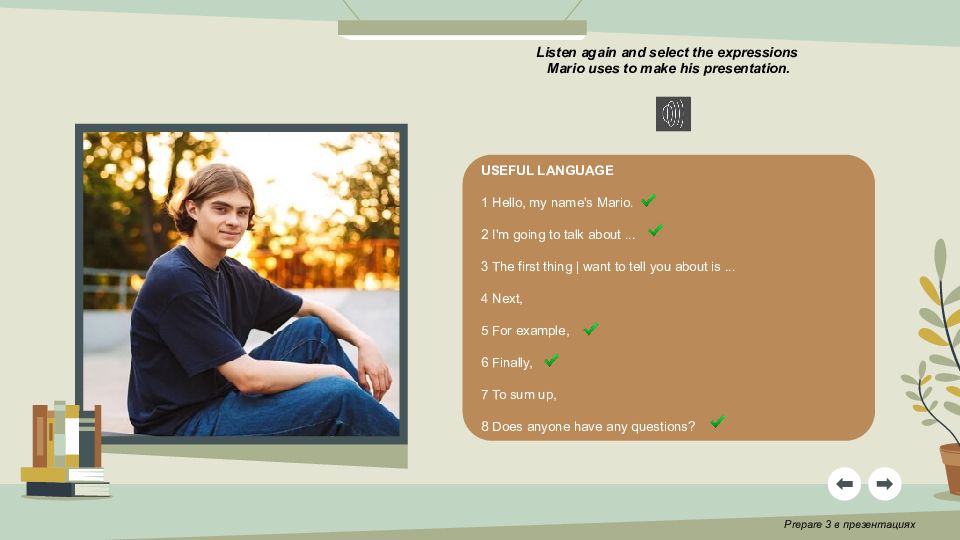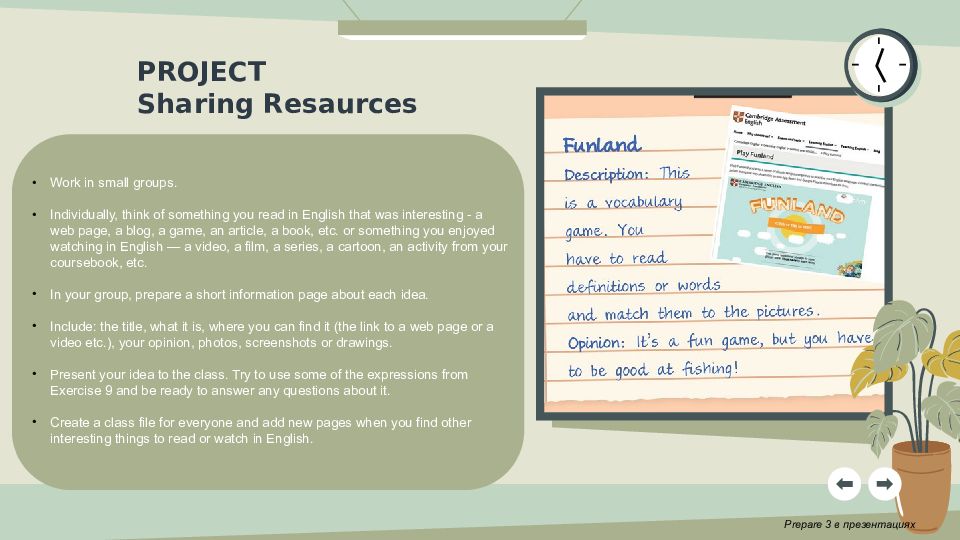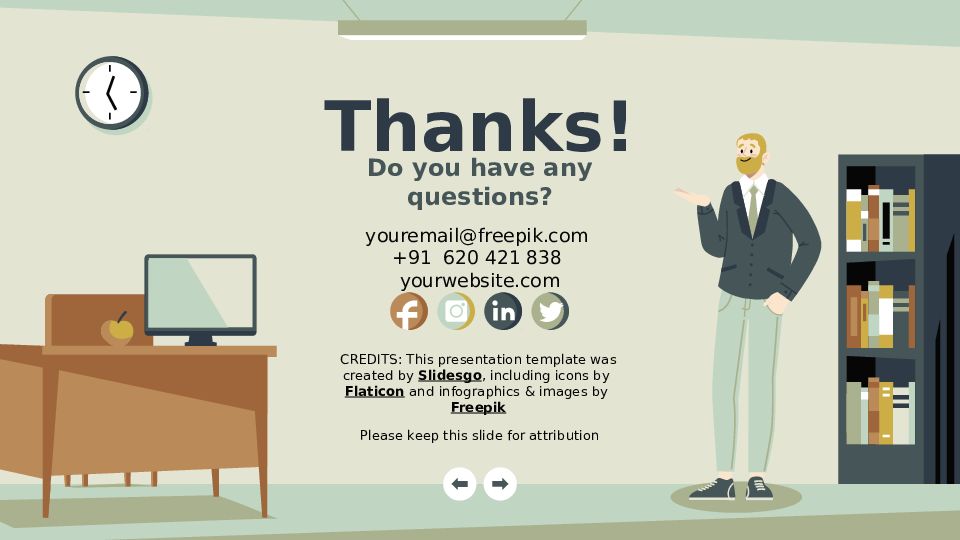Первый слайд презентации: Life Skills Learning to Learn Effective Learning
Prepare 3 в презентациях
Слайд 2: To learn something well you need to - use notebooks - practice - revise - try It’s normal to make mistakes when we are doing something new. We can learn from our mistakes as well
Prepare 3 в презентациях
Слайд 3
1 How did you learn that 2 x 2 = 4, 2 x 3 = 6, 2 x 4 = 8, etc.? a) At first, I couldn't/t do it, but my brother helped me to go along our street every day until one day I could do it by myself. 2 How did you learn to ride a bicycle? b) We said it in class and repeated it lots and lots of times. 3 How do you learn to remember names and dates in history? c) I work with a friend and we ask each other questions about the things we learn in class. Match the questions to the possible answers. Prepare 3 в презентациях
Слайд 4: 01
Think about how you learn and answer the questions. How did you learn that 2 x 2=4, 2x3=6,2x4=8, etc.? 02. How did you learn to ride a bicycle ? 03. How do you learn to remember namesand dates in history ? Prepare 3 в презентациях
Слайд 5
Read the text. Choose the language skills it mentions. WHAT WAS THE FIRST WORD YOU SAID? Have you ever thought about how babies learn to speak? For the first months of their lives, they cry and make noises, but, in general, children start forming words when they are about 12 months old. Which are the first words they say? Sometimes, they are the words they hear most often, sometimes the words for things they like. They usually start with words like mama, papa or dada. Some scientists say that sounds like ma, da, pa and ba are the easiest sounds to make, so when parents are very happy because their child is saying mama, in fact the baby is just experimenting with making noises! a) reading / b) listening / c) speaking / d) writing All children begin learning their language first by listening and then speaking. They start with words for objects, like car or dog, then verbs for actions, like drink or eat, slowly adding other kinds of words to make sentences. They can understand more difficult words and sentences, but they can’t say them. Some children speak more than others (just like adults!) and some children speak earlier than others, but by practising they all learn in the end. One mother tells the story of her son who didn’t speak until he was four years old. Before then, he pointed when he wanted something or just made strange noises. One day, he came into the kitchen for breakfast and said, ‘Can I have some chocolate cereal, please?’ And then, he never stopped chatting. So when you start to learn another language, remember that it took years for you to learn yours! If you keep listening and trying hard to speak, you improve, just like in your own language. Prepare 3 в презентациях
Слайд 6: Did you know?
Babies can learn any language. No language is more difficult than another. Most children say their first words between 11 and 14 months old. A boy from the USA, Michael Kearney, spoke his first words when he was four months old and finished secondary school when he was six years old. Did you know? Prepare 3 в презентациях
Слайд 7
Read the text again. Are the sentences right (✔) or wrong (✘)? WHAT WAS THE FIRST WORD YOU SAID? Have you ever thought about how babies learn to speak? For the first months of their lives, they cry and make noises, but, in general, children start forming words when they are about 12 months old. Which are the first words they say? Sometimes, they are the words they hear most often, sometimes the words for things they like. They usually start with words like mama, papa or dada. Some scientists say that sounds like ma, da, pa and ba are the easiest sounds to make, so when parents are very happy because their child is saying mama, in fact the baby is just experimenting with making noises! 1 Babies make their first sounds when they are about a year old. 2 Their first words are often words they have heard a lot. 3 Some scientists think that babies aren’t thinking about their mother when they say mama. 4 Babies use verbs before nouns when they start speaking. 5 The boy who didn’t speak until he was four didn’t make any sounds at all. 6 You can learn a new language better if you listen more and talk less. All children begin learning their language first by listening and then speaking. They start with words for objects, like car or dog, then verbs for actions, like drink or eat, slowly adding other kinds of words to make sentences. They can understand more difficult words and sentences, but they can’t say them. Some children speak more than others (just like adults!) and some children speak earlier than others, but by practising they all learn in the end. One mother tells the story of her son who didn’t speak until he was four years old. Before then, he pointed when he wanted something or just made strange noises. One day, he came into the kitchen for breakfast and said, ‘Can I have some chocolate cereal, please?’ And then, he never stopped chatting. So when you start to learn another language, remember that it took years for you to learn yours! If you keep listening and trying hard to speak, you improve, just like in your own language. Prepare 3 в презентациях
Слайд 8
Match the highlighted words in the text to the definitions. WHAT WAS THE FIRST WORD YOU SAID? Have you ever thought about how babies learn to speak? For the first months of their lives, they cry and make noises, but, in general, children start forming words when they are about 12 months old. Which are the first words they say? Sometimes, they are the words they hear most often, sometimes the words for things they like. They usually start with words like mama, papa or dada. Some scientists say that sounds like ma, da, pa and ba are the easiest sounds to make, so when parents are very happy because their child is saying mama, in fact the baby is just experimenting with making noises! 1 making an effort to do something _____________ 2 doing new things to find out something _____________ 3 repeating something again and again _____________ 4 talking _____________ 5 making the shape of something _____________ 6 increasing the number of something _____________ All children begin learning their language first by listening and then speaking. They start with words for objects, like car or dog, then verbs for actions, like drink or eat, slowly adding other kinds of words to make sentences. They can understand more difficult words and sentences, but they can’t say them. Some children speak more than others (just like adults!) and some children speak earlier than others, but by practising they all learn in the end. One mother tells the story of her son who didn’t speak until he was four years old. Before then, he pointed when he wanted something or just made strange noises. One day, he came into the kitchen for breakfast and said, ‘Can I have some chocolate cereal, please?’ And then, he never stopped chatting. So when you start to learn another language, remember that it took years for you to learn yours! If you keep listening and trying hard to speak, you improve, just like in your own language. Prepare 3 в презентациях chatting adding practising trying hard experimenting forming
Слайд 9
Listen to Mario talking to his class about learning English. Why did he improve? Prepare 3 в презентациях
Слайд 10
Listen again and complete the sentences. 1)Mario didn’t like English at first because he couldn’t remember the __________ and had difficulty pronouncing the _______________. 2) He met the brothers at the _______________. 3) He wrote the words in a book and _______________ to show the meaning. 4) After the holiday, he sent his new friends _______________. 5) When he needed a new word, he used an _______________. 6) He’s going to _______________ his friends next summer. vocabulary sounds beach drew pictures an email online dictionary stay with Mario : Hello. My name’s Mario and I’m from Italy. Today, I’m going to talk about my experience learning English. When I was small I didn’t like learning English. There was too much vocabulary and too many sounds. I couldn’t remember them all. I only had class three hours a week, so we didn’t practise much. Really, I didn’t understand why I had to say things in a different way when I only needed my own language to have fun with my friends and family. Everything changed one summer when I was on holiday at the beach. I met two boys about my age who were brothers. We played football on the sand and swam in the sea. But they didn’t speak Italian, they only spoke English. I listened carefully when they were talking and slowly, I began to understand some words. I really wanted to talk to them, so I pointed at things I wanted to know the vocabulary for. They told me the words and I wrote them in a little book I had and drew pictures to show the meaning. For example, I drew a boat, an ice cream, a fish and a crab. At the end of the holiday they gave me their email address and we all went home. I started to write to them, but I needed more words. I found lots of useful things in an online dictionary. I also started watching English films and series. It was hard at first, but I learnt more and more. Finally, when my friends write to me now, I hardly ever need a dictionary. Next summer I am going to stay with them for a week and then they are coming to stay here. I can’t wait! Does anyone have any questions? Prepare 3 в презентациях
Слайд 11
Listen again and select the expressions Mario uses to make his presentation. USEFUL LANGUAGE 1 Hello, my name's Mario. 2 I'm going to talk about... 3 The first thing | want to tell you about is... 4 Next, 5 For example, 6 Finally, 7 To sum up, 8 Does anyone have any questions? Prepare 3 в презентациях
Слайд 12: PROJECT Sharing Resaurces
Work in small groups. Individually, think of something you read in English that was interesting - a web page, a blog, a game, an article, a book, etc. or something you enjoyed watching in English — a video, a film, a series, a cartoon, an activity from your coursebook, etc. In your group, prepare a short information page about each idea. Include: the title, what it is, where you can find it (the link to a web page or a video etc.), your opinion, photos, screenshots or drawings. Present your idea to the class. Try to use some of the expressions from Exercise 9 and be ready to answer any questions about it. Create a class file for everyone and add new pages when you find other interesting things to read or watch in English. Prepare 3 в презентациях
